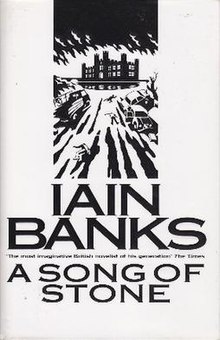Plot summary
Abel and Morgan, an aristocratic couple, live in a small castle in an indeterminate place and time of civil war. They decide to abandon their home and join a trek of refugees seeking safety. A group of irregulars, led by a woman called "The Lieutenant" (or "Loot"), stops them and takes them back to the castle, which the irregulars fortify as a base. They loot the castle, and Morgan is seduced by the Lieutenant. A rival faction attacks the castle with artillery and Abel is taken along with the fighters on a counter-attack. When they return, Abel almost shoots the Lieutenant and there is a violent and nihilistic ending.
A Song of Stone tells the frightening story of what happens when the normal rules of society break down. Themes of decadence, violence and war are intertwined with the lives of the rather pompous but lyrical disgraced aristocrat Abel, his partner Morgan, the ruthless Lieutenant and her soldiers with names like "Psycho", "Karma" and "Deathwish".
The story is told by Abel, an unreliable narrator. Abel describes Morgan's actions in the second person, mostly when she is in his direct view.
As the invaders systematically loot and destroy Abel's family's ancestral home, Abel seems ambivalent to what is happening. Later, when the Lieutenant suggests a memorial for Abel's lifelong family retainer, who has just been killed, Abel and the reader realise that he does not know the servant's surname.
The violence of war is described graphically.

Iain Banks was a Scottish author, writing mainstream fiction as Iain Banks and science fiction as Iain M. Banks, adding the initial of his adopted middle name Menzies. After the success of The Wasp Factory (1984), he began to write full time. His first science fiction book, Consider Phlebas, appeared in 1987, marking the start of the Culture series. His books have been adapted for theatre, radio, and television. In 2008, The Times named Banks in their list of "The 50 greatest British writers since 1945".
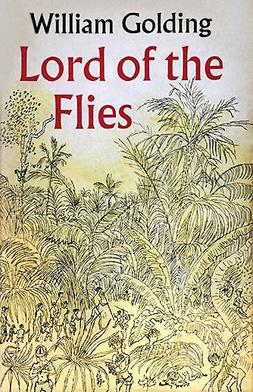
Lord of the Flies is the 1954 debut novel of British author William Golding. The plot concerns a group of British boys who are stranded on an uninhabited island and their disastrous attempts to govern themselves. The novel's themes include morality, leadership, and the tension between civility and chaos.

The Wasp Factory is the first novel by Scottish writer Iain Banks, published in 1984. Before the publication of The Wasp Factory, Banks had written several science fiction novels that had not been accepted for publication. Banks decided to try a more mainstream novel in the hopes that it would be more readily accepted, and wrote about a psychopathic teenager living on a remote Scottish island. According to Banks, this allowed him to treat the story as something resembling science fiction – the island could be envisaged as a planet, and Frank, the protagonist, almost as an alien. Following the success of The Wasp Factory, Banks began to write full-time.

Inversions is a science fiction novel by Scottish writer Iain M. Banks, first published in 1998. Banks has said "Inversions was an attempt to write a Culture novel that wasn't."

The Player of Games is a science fiction novel by Scottish writer Iain M. Banks, first published in 1988. It was the second published Culture novel. A film version was planned by Pathé in the 1990s, but was abandoned.

Excession is a 1996 science fiction novel by Scottish writer Iain M. Banks. It is the fifth in the Culture series, a series of ten science fiction novels which feature a utopian fictional interstellar society called the Culture. It concerns the response of the Culture and other interstellar societies to an unprecedented alien artifact, the Excession of the title.

Feersum Endjinn is a science fiction novel by Scottish writer Iain M. Banks, first published in 1994. It won a British Science Fiction Association Award in 1994.

Dead Air is a Scottish novel by Iain Banks, published in 2002.

In the biblical Book of Genesis, Cain and Abel are the first two sons of Adam and Eve. Cain, the firstborn, was a farmer, and his brother Abel was a shepherd. The brothers made sacrifices, each from his own fields, to God. God regarded Abel's offering, but not Cain's. Cain killed Abel and God cursed Cain, sentencing him to a life of transience. Cain then dwelt in the land of Nod, where he built a city and fathered the line of descendants beginning with Enoch.

Ride with the Devil is a 1999 American revisionist Western film directed by Ang Lee and starring Tobey Maguire, Skeet Ulrich, Jeffrey Wright, Jewel in her feature film debut, Simon Baker, Jonathan Rhys Meyers, James Caviezel, Thomas Guiry and Jonathan Brandis. Based on the novel Woe to Live On, by Daniel Woodrell, the film, set during the American Civil War, follows a group of men who join the First Missouri Irregulars, also known as the Bushwhackers—guerrilla units loyal to pro-Confederacy units of the state—and their war against Northern Jayhawkers allied with the Union army.
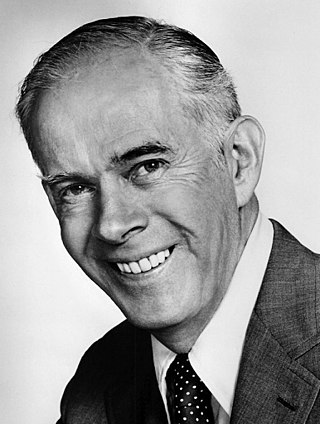
Harry Morgan was an American actor whose television and film career spanned six decades. Morgan's major roles included Pete Porter in both December Bride (1954–1959) and Pete and Gladys (1960–1962); Officer Bill Gannon on Dragnet (1967–1970); Amos Coogan on Hec Ramsey (1972–1974); and his starring role as Colonel Sherman T. Potter in M*A*S*H (1975–1983) and AfterMASH (1983–1985). Morgan also appeared as a supporting player in more than 100 films.
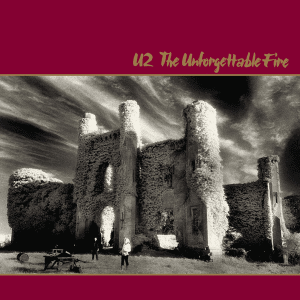
The Unforgettable Fire is the fourth studio album by Irish rock band U2. It was produced by Brian Eno and Daniel Lanois, and released on 1 October 1984 by Island Records. The band wanted to pursue a new musical direction following the harder-hitting rock of their previous album, War (1983). As a result, they employed Eno and Lanois to produce and assist in their experimentation with a more ambient sound. The resulting change in direction was at the time the band's most dramatic. The album's title is a reference to "The Unforgettable Fire", an art exhibit about the atomic bombing of Hiroshima.

The 1992 Los Angeles riots were a series of riots and civil disturbances that occurred in Los Angeles County, California, United States, during April and May 1992. Unrest began in South Central Los Angeles on April 29, after a jury acquitted four officers of the Los Angeles Police Department (LAPD) charged with using excessive force in the arrest and beating of Rodney King. The incident had been videotaped by George Holliday, who was a bystander to the incident, and was heavily broadcast in various news and media outlets.

Japanese castles are fortresses constructed primarily of wood and stone. They evolved from the wooden stockades of earlier centuries and came into their best-known form in the 16th century. Castles in Japan were built to guard important or strategic sites, such as ports, river crossings, or crossroads, and almost always incorporated the landscape into their defenses.
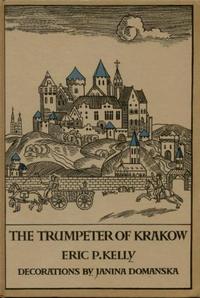
The Trumpeter of Krakow is a 1928 young adult historical novel by Eric P. Kelly. It won the Newbery Medal for excellence in American children's literature in 1929.
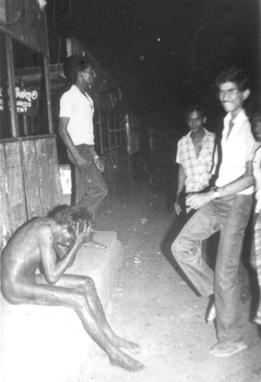
Black July was an anti-Tamil pogrom that occurred in Sri Lanka during July 1983. The pogrom was premeditated, and was finally triggered by a deadly ambush on 23 July 1983, which caused the death of 13 Sri Lanka Army soldiers, by the Tamil militant group Liberation Tigers of Tamil Eelam (LTTE). Although initially orchestrated by members of the ruling UNP, the pogrom soon escalated into mass violence with significant public participation.

Dies the Fire is a 2004 alternate history and post-apocalyptic novel written by S. M. Stirling. It is the first installment of the Emberverse series and is a spin-off from S. M. Stirling's Nantucket series in which the Massachusetts island of Nantucket is thrown back in time from March 17, 1998, to the Bronze Age.
The Culture series is a science fiction series written by Scottish author Iain M. Banks and released from 1987 through to 2012. The stories centre on The Culture, a utopian, post-scarcity space society of humanoid aliens, and advanced superintelligent artificial intelligences living in artificial habitats spread across the Milky Way galaxy. The main themes of the series are the dilemmas that an idealistic, more-advanced civilization faces in dealing with smaller, less-advanced civilizations that do not share its ideals, and whose behaviour it sometimes finds barbaric. In some of the stories, action takes place mainly in non-Culture environments, and the leading characters are often on the fringes of the Culture, sometimes acting as agents of Culture in its plans to civilize the galaxy. Each novel is a self-contained story with new characters, although reference is occasionally made to the events of previous novels.
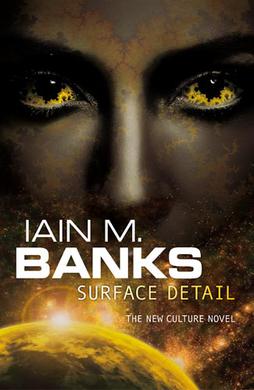
Surface Detail by Iain M. Banks is a science fiction novel in his Culture series, first published in the UK on 7 October 2010 and the US on 28 October 2010.

Hellboy: The Wild Hunt is the ninth collected edition in Mike Mignola's Hellboy comic book series, the second of three connected story arcs written by Mignola and illustrated by Duncan Fegredo. Its eight chapters, collected in March 2010, were originally released from December 2008 through November 2009 as issues 1-8 of the Hellboy: The Wild Hunt limited series, also numbered as issues 37 through 44 of the continuing Hellboy series. The storyline delves into Irish and Arthurian legend, reprising several characters first introduced in Hellboy short story "The Corpse". As with Hellboy stories generally, it was published by Dark Horse Comics.
